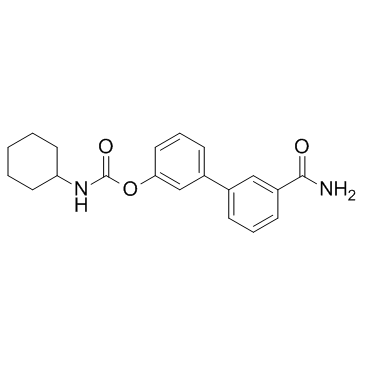URB597

URB597 structure
|
Common Name | URB597 | ||
|---|---|---|---|---|
| CAS Number | 546141-08-6 | Molecular Weight | 338.400 | |
| Density | 1.2±0.1 g/cm3 | Boiling Point | 533.2±50.0 °C at 760 mmHg | |
| Molecular Formula | C20H22N2O3 | Melting Point | N/A | |
| MSDS | Chinese USA | Flash Point | 276.3±30.1 °C | |
| Symbol |


GHS07, GHS09 |
Signal Word | Warning | |
|
Activation of PPAR gamma receptors reduces levodopa-induced dyskinesias in 6-OHDA-lesioned rats.
Neurobiol. Dis. 74 , 295-304, (2015) Long-term administration of l-3,4-dihydroxyphenylalanine (levodopa), the mainstay treatment for Parkinson's disease (PD), is accompanied by fluctuations in its duration of action and motor complications (dyskinesia) that dramatically affect the quality of lif... |
|
|
Endocannabinoids regulate the activity of astrocytic hemichannels and the microglial response against an injury: In vivo studies.
Neurobiol. Dis. 79 , 41-50, (2015) Anandamide (AEA) is an endocannabinoid (EC) that modulates multiple functions in the CNS and that is released in areas of injury, exerting putative neuroprotective actions. In the present study, we have used intravital microscopy to analyze the role of the EC... |
|
|
Correlating FAAH and anandamide cellular uptake inhibition using N-alkylcarbamate inhibitors: from ultrapotent to hyperpotent.
Biochem. Pharmacol. 92(4) , 669-89, (2014) Besides the suggested role of a putative endocannabinoid membrane transporter mediating the cellular uptake of the endocannabinoid anandamide (AEA), this process is intrinsically coupled to AEA degradation by the fatty acid amide hydrolase (FAAH). Differentia... |
|
|
Inhibition of anandamide hydrolysis attenuates nociceptor sensitization in a murine model of chemotherapy-induced peripheral neuropathy.
J. Neurophysiol. 113(5) , 1501-10, (2015) Painful neuropathy frequently develops as a consequence of commonly used chemotherapy agents for cancer treatment and is often a dose-limiting side effect. Currently available analgesic treatments are often ineffective on pain induced by neurotoxicity. Althou... |
|
|
Interaction between the cholecystokinin and endogenous cannabinoid systems in cued fear expression and extinction retention.
Neuropsychopharmacology 40(3) , 688-700, (2015) Post-traumatic stress disorder (PTSD) is thought to develop, in part, from improper inhibition of fear. Accordingly, one of the most effective treatment strategies for PTSD is exposure-based psychotherapy. Ideally, neuroscience would inform adjunct therapies ... |
|
|
Hippocampal metaplasticity is required for the formation of temporal associative memories.
J. Neurosci. 34(50) , 16762-73, (2014) Metaplasticity regulates the threshold for modification of synaptic strength and is an important regulator of learning rules; however, it is not known whether these cellular mechanisms for homeostatic regulation of synapses contribute to particular forms of l... |
|
|
Sex Differences in Molecular Signaling at Inhibitory Synapses in the Hippocampus.
J. Neurosci. 35 , 11252-65, (2015) The possibility that mechanisms of synaptic modulation differ between males and females has far-reaching implications for understanding brain disorders that vary between the sexes. We found recently that 17β-estradiol (E2) acutely suppresses GABAergic inhibit... |
|
|
Involvement of fatty acid amide hydrolase and fatty acid binding protein 5 in the uptake of anandamide by cell lines with different levels of fatty acid amide hydrolase expression: a pharmacological study.
PLoS ONE 9(7) , e103479, (2014) The endocannabinoid ligand anandamide (AEA) is removed from the extracellular space by a process of cellular uptake followed by metabolism. In many cells, such as the RBL-2H3 cell line, inhibition of FAAH activity reduces the observed uptake, indicating that ... |
|
|
Ethanol attenuation of long-term depression in the nucleus accumbens can be overcome by activation of TRPV1 receptors.
Alcohol. Clin. Exp. Res. 38(11) , 2763-9, (2014) Altered expression of synaptic plasticity within the nucleus accumbens (NAc) constitutes a critical neuroadaptive response to ethanol (EtOH) and other drugs of abuse. We have previously reported that N-methyl-D-aspartate receptor (NMDAR)-dependent long-term d... |
|
|
Anti-inflammatory effects of N-acylethanolamines in rheumatoid arthritis synovial cells are mediated by TRPV1 and TRPA1 in a COX-2 dependent manner.
Arthritis. Res. Ther. 17 , 321, (2015) The endocannabinoid system modulates function of immune cells and mesenchymal cells such as fibroblasts, which contribute to cartilage destruction in rheumatoid arthritis (RA). The aim of the study was to determine the influence of N-acylethanolamines anandam... |